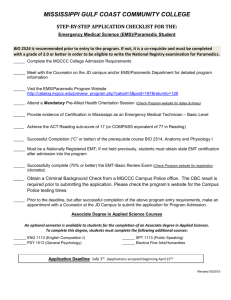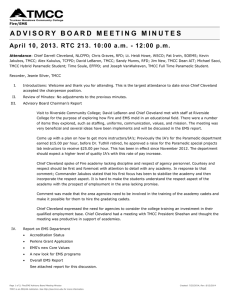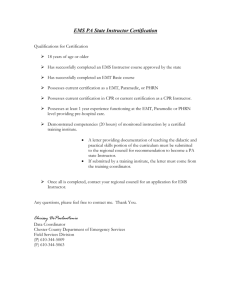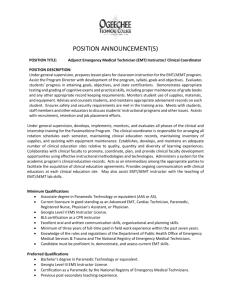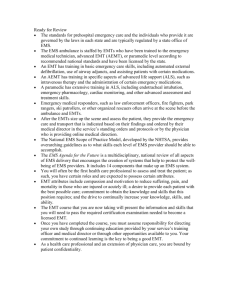A D V I S O R Y ... J u n e 1 8 , 2...
advertisement
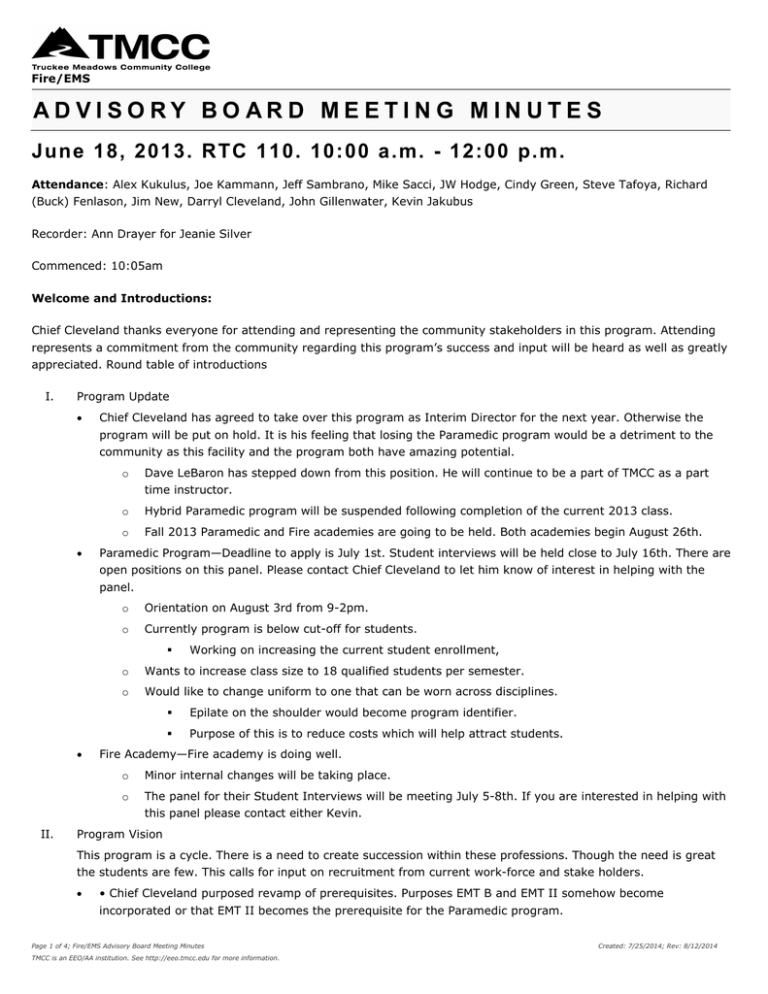
Fire/EMS ADVISORY BO ARD MEETING MINUTES June 18, 2013. RTC 110. 10:00 a.m. - 12:00 p.m. Attendance: Alex Kukulus, Joe Kammann, Jeff Sambrano, Mike Sacci, JW Hodge, Cindy Green, Steve Tafoya, Richard (Buck) Fenlason, Jim New, Darryl Cleveland, John Gillenwater, Kevin Jakubus Recorder: Ann Drayer for Jeanie Silver Commenced: 10:05am Welcome and Introductions: Chief Cleveland thanks everyone for attending and representing the community stakeholders in this program. Attending represents a commitment from the community regarding this program’s success and input will be heard as well as greatly appreciated. Round table of introductions I. Program Update • Chief Cleveland has agreed to take over this program as Interim Director for the next year. Otherwise the program will be put on hold. It is his feeling that losing the Paramedic program would be a detriment to the community as this facility and the program both have amazing potential. o Dave LeBaron has stepped down from this position. He will continue to be a part of TMCC as a part time instructor. • o Hybrid Paramedic program will be suspended following completion of the current 2013 class. o Fall 2013 Paramedic and Fire academies are going to be held. Both academies begin August 26th. Paramedic Program—Deadline to apply is July 1st. Student interviews will be held close to July 16th. There are open positions on this panel. Please contact Chief Cleveland to let him know of interest in helping with the panel. o Orientation on August 3rd from 9-2pm. o Currently program is below cut-off for students. • Working on increasing the current student enrollment, o Wants to increase class size to 18 qualified students per semester. o Would like to change uniform to one that can be worn across disciplines. Epilate on the shoulder would become program identifier. Purpose of this is to reduce costs which will help attract students. Fire Academy—Fire academy is doing well. o Minor internal changes will be taking place. o The panel for their Student Interviews will be meeting July 5-8th. If you are interested in helping with this panel please contact either Kevin. II. Program Vision This program is a cycle. There is a need to create succession within these professions. Though the need is great the students are few. This calls for input on recruitment from current work-force and stake holders. • • Chief Cleveland purposed revamp of prerequisites. Purposes EMT B and EMT II somehow become incorporated or that EMT II becomes the prerequisite for the Paramedic program. Page 1 of 4; Fire/EMS Advisory Board Meeting Minutes TMCC is an EEO/AA institution. See http://eeo.tmcc.edu for more information. Created: 7/25/2014; Rev: 8/12/2014 Fire/EMS Advisory Board Meeting Minutes o Chief Gillenwater suggested revamping prerequisites include minimum Math and English requirements, and perhaps A&P instead of combing EMT B and EMT II. Comment made that moves such as these could possibly preclude clientele within California. JW suggested finding a way to fill in the gaps in knowledge rather than make requirements heavier. • Order of Fire Academy prerequisites is under review. o III. Looking into holding EMT B prior to FT 102. It is not necessarily needed for entry into FT 101. EMT B would still need to be fulfilled prior to the Fire Academy start date. Program Direction • Plans are in the works to increase quality of education. • Teaching credentials will be fully vetted. • Will be ascertaining full time employee skills o • Will evaluate instructors by sitting in on classes. It will be the job of the Director to complete coordination. o Comment was made Jeff does a wonderful job with the current coordination. Cindy and JW would like to be apprised of whoever would take on that role. IV. Accreditation Status TMCC had demonstrated their commitment to renewing this program by: V. o Sending Chief Cleveland to essential classes o Spending a considerable sum for a mock site visit in preparation for the CoAMPS site visit. • This program is currently under a letter of review by CoAMPS. • While waiting for CoAMPS to approve Chief Cleveland student testing for the Nationals is still viable. Instructor Pool Having a qualified instructor pool is important and urgent. There is a real need for highly professional instructors within this program. Need to revamp this program so that students are able to work in any environment with professionalism. Teaching entire package is integral to the changing the workforce. Instructor Code of Ethics and Conduct • • Working to establish ethics and code of conduct are observed. o Changing the culture of our profession starts in the classroom. o Instructors are not here to be pals. o Chief Cleveland is asking community stakeholders to give input regarding needs. o This is crucial to ensure needs are being met and also to rectify any problems. Will be keeping a closer eye on student evaluations. o Student is our customer. o EMS expands every year and will continue expanding exponentially. o Expressed desire for the community stake holders to share whatever they may hear regarding classes or instructors. o Buck suggested copies of course and instructor evaluations be requested through his office. These can help with a critical review of what has or has not worked with previous classes. Instructor pay rate & IA rate • Pay for the assistants will be increased as follows: o Paramedic Academy assistants will be raised to $25 per hour Page 2 of 4; Fire/EMS Advisory Board Meeting Minutes TMCC is an EEO/AA institution. See http://eeo.tmcc.edu for more information. Rev.: 8/12/2014 Fire/EMS Advisory Board Meeting Minutes o Fire Academy assistants will be raised to $18 per hour o EMS assistants will be raised to $15 per hour. • This was done in order to obtain solid time commitments from assistants. Would like to split the current Lead Instructor position. o Current pay is $48 per hour. o Would like two instructors splitting both pay and curriculum. o Would like to model School of Medicine in some aspects. Med School does not have one primary instructor with no additional instructors. Therefore neither should we. • Fire Academy—EMS is the biggest chunk of entering the Fire Academy. o EMT Basic directly impacts the Fire academy. Working on EMS will only strengthen an already strong Fire Academy. o Fire Academy is comprised of four professors teaching a standard curriculum. o Students receive Certificate of Awareness for driving rigs. o Point of this certificate is to help students gain experience with driving a rig. Chief Gillenwater suggested that the class could be opened to other professionals so that it will fulfill more needs. o Chief Cleveland asked that if firehouses would prefer that duties such as these be regulated back for them to handle please let him know. VI. Building Experience program with Stakeholders for EMT-B’s There is a general feeling that the EMT B class alone is not sufficient enough for a leap-frog into the paramedic level of knowledge. Basics should see EMT in action prior to administrating higher levels of medicinal care. • Chief Cleveland purposes a work experience program as a supplement to revamping of prerequisites. The idea is that work development would provide missing information between EMT B and the Paramedic program. This would be equivalent to an unpaid internship with volunteers covered by Workman’s Comp. Realizes there would be compromises between state and private sector to set this up. o This step would to be completed prior to Paramedic admission. Suggestion offered that preference points could be given to those who complete work experience. This way an already limited student pool would not become further restricted. Comment made that as the candidate pool is small perhaps it would be a good policy to fill seats prior to becoming selective. o Comment made that the availability of volunteering options is not very high. o Concern expressed as to what exactly would be required as unnecessary skills (i.e. field phone calls) should not qualify as experience. o Idea offered that a resource manual may be put together in order to offer places to volunteer. Idea offered of rewriting NAC regulations to create an “experience license” with a set expiration time frame. This work experience could then be offered. • VII. Chief Cleveland will follow up with this by placing it on the agenda for the next Chief’s meeting. Stakeholder input, participation, and commitment Question was asked by Alex as to why there is a glut of essential certificate programs and if it would be possible to offer these classes. • He expressed that TMCC does a great job of assisting beginners in the EMS experience. • Existing students are stymied. Capturing these students will expand the school’s cliental base. Page 3 of 4; Fire/EMS Advisory Board Meeting Minutes TMCC is an EEO/AA institution. See http://eeo.tmcc.edu for more information. Rev.: 8/12/2014 Fire/EMS Advisory Board Meeting Minutes • Idea was put forward to create degrees and/or certificates that would be accepted interstate (i.e. between Nevada and California) o Kevin responded that he has been working this issue for a few years. Some requirements are state specific; however, revenue seems the primary issue that keeps this idea from materializing. • Chief Cleveland responded part of the problem is classes between institutions are often considered nontransferrable. o The program for EMS is still running on a 1970’s model which is obsolete. o If EMS was a degree granting program it could offer tracks, a major emphasis, create valuable new hires for agencies, and students would receive an Associate’s degree when they graduate. Becoming a degree program is ideal and gives students strong incentive to enroll for these programs. Not doing this is a disservice to the students and our professions Paramedics and Firefighters will be seen as professionals when they have the academics to back them up. VIII. Roundtable Additional comments as follows: • Teaching 12 Leads more thoroughly would be highly beneficial. • Vent management and blood product administration needs to be addressed in the classroom. • Teaching S.T.A.B.L.E. would be helpful to replace NRP class and test. • Paramedic Overnights will continue. • Mike Sacci—Paramedic Hybrid Class President: • o Assured everyone the “hiccups are going away.” o Whole heartedly seconds the idea of 12 Leads being thoroughly covered. Chief Cleveland stated he wants more student ownership of this program. Wants class presidents in attendance whenever possible. Chief Cleveland recognizes TMCC’s current reputation is lacking o Has been in steady decline for years. o Feels addressing instructor issues is the right first step. • Better instructors create better students which creates a better reputation. Dean New stated he appreciated everyone attending and thanks them all for what they done for TMCC and being willing to help at this time. Next Meeting Date: No date/time set. Adjournment: 11:50pm Page 4 of 4; Fire/EMS Advisory Board Meeting Minutes TMCC is an EEO/AA institution. See http://eeo.tmcc.edu for more information. Rev.: 8/12/2014
